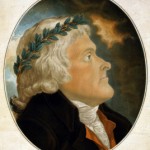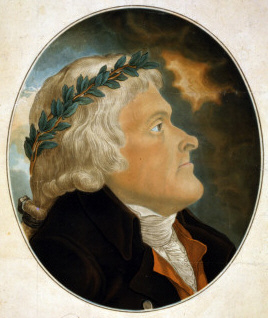On The Organization Of Thomas Jefferson’s Summary of the Philosophy of Epicurus
 At the end of his letter to William Short dated October 31, 1819, Thomas Jefferson attached the following outline of his view of the central doctrines of Epicurus. Aside from the serving as an excellent summary, Jefferson’s organization of the key ideas serves as a useful reminder that the Moral aspects of Epicureanism rest on Physical observations about the nature of the universe. Unless the Physical observations are essentially true, the Moral observations are themselves invalid. Most central of these Physical observations, of course, are (1) that the universe is eternal, operating on their own natural laws (and therefore not created by any god nor randomly arising from nothing), and (2) that gods do not meddle with the affairs of men.
At the end of his letter to William Short dated October 31, 1819, Thomas Jefferson attached the following outline of his view of the central doctrines of Epicurus. Aside from the serving as an excellent summary, Jefferson’s organization of the key ideas serves as a useful reminder that the Moral aspects of Epicureanism rest on Physical observations about the nature of the universe. Unless the Physical observations are essentially true, the Moral observations are themselves invalid. Most central of these Physical observations, of course, are (1) that the universe is eternal, operating on their own natural laws (and therefore not created by any god nor randomly arising from nothing), and (2) that gods do not meddle with the affairs of men.
Syllabus of the doctrines of Epicurus.
Physical. —
The Universe eternal.
Its parts, great and small, interchangeable.
Matter and Void alone.
Motion inherent in matter which is weighty and declining.
Eternal circulation of the elements of bodies.
Gods, an order of beings next superior to man, enjoying in their sphere, their own
felicities; but not meddling with the concerns of the scale of beings below them.
Moral. —
Happiness the aim of life.
Virtue the foundation of happiness.
Utility the test of virtue.
Pleasure active and In-do-lent.
In-do-lence is the absence of pain, the true felicity.
Active, consists in agreeable motion; it is not happiness, but the means to produce it.
Thus the absence of hunger is an article of felicity; eating the means to obtain it.
The summum bonum is to be not pained in body, nor troubled in mind.
i. e. In-do-lence of body, tranquillity of mind.
To procure tranquillity of mind we must avoid desire and fear, the two principal
diseases of the mind.
Man is a free agent.
Virtue consists in 1. Prudence. 2. Temperance. 3. Fortitude. 4. Justice.
To which are opposed, 1. Folly. 2. Desire. 3. Fear. 4. Deceit.

